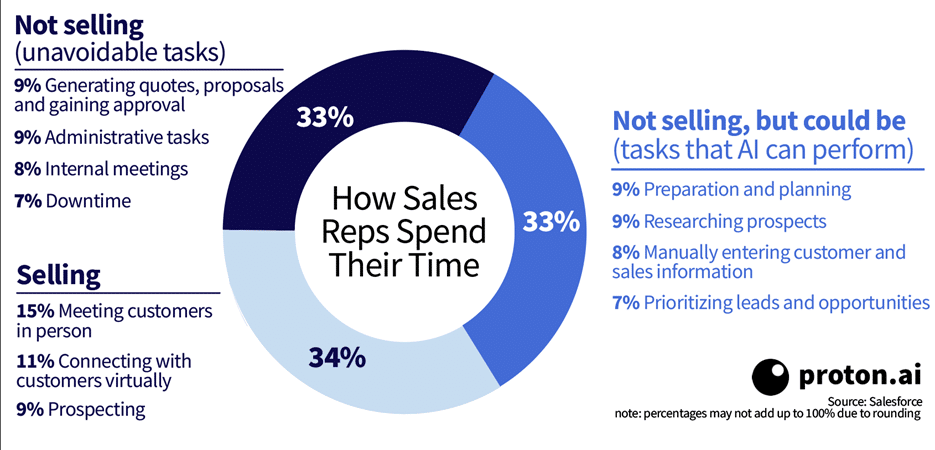Today, distributors can choose from an array of sales tools that all promise data-driven results. In theory, this should help distributors understand their customers and enhance their sales processes. In reality, however, many of these “smart” sales solutions end up causing more problems than they solve. That simply should not happen.
This article will explain the key difference between AI and BI. In doing so, it will clearly demonstrate why AI is a superior sales tool for distributors. Further, it will help distributors see through the hype to find sales solutions that deliver results.
The Difference Between BI and AI
BI tools are software that graph data or present information in a visually compelling way. In doing so, BI can make it easier for business leaders and sales reps to interpret data and make more informed decisions. For reference, some popular BI tools today include Tableau, Qlik and Phocus.
In contrast, AI describes a large set of technologies that collect, process and analyze data. In the context of distribution sales, this means that AI is more of a forward-looking technology than a backward-looking one. Whereas BI provides users with a compelling visualization of what has already happened, AI offers individuals a precise prediction about what will happen.
While both technologies are “data-driven,” AI clearly leverages data in a more efficient way. BI tools collect information, but they don’t actually do all that much with it. This means that they place the burden of data analysis on reps. For example, a rep working with a BI tool might be presented with a graphic depiction of a customer’s order history or spend in various categories. Upon seeing this, that rep would be expected to analyze the information to figure out what to pitch that customer next time they called.
If that rep were using an AI sales tool, on the other hand, they would skip the analysis and go straight to selling. Instead of seeing raw data, or graphic depictions of raw data, the rep would see a straightforward recommendation on what action to take: Recommend product X. Ask about product Y. Instead of forcing sales reps to act as analysts, AI allows them to do what they do best.
There is an obvious utility to both systems. But the difference between passive displays of information and proactive tools is massive. With BI tools, you’re giving reps a map and a compass and asking them to figure out how to get somewhere. With AI tools, you’re giving them a GPS sales navigator that tells them where to go. Retroactive displays of data might get the job done eventually if reps are expert analysts. But proactive tools will be quicker and more accurate for reps whose focus is connecting with customers instead of reading data.
Current data from Salesforce suggests that today’s reps are woefully ill-equipped. In an average week, reps spend only about one-third of their time selling, and two-thirds of their time doing things like lead prioritization, prospect research, manual data entry and sales planning. While these reps are busy using BI tools to help them do the kind of homework that AI could automate, their companies are losing valuable sales opportunities.

Reps are not data analysts. When reps put a lot of effort into reading charts instead of connecting with customers, distributors lose one of their most valuable assets: the time that reps spend with customers.
With AI, sales reps will be able to stop analyzing and get back to selling. This change isn’t just limited to outside sales reps, too. Inside sales teams and inbound customer service reps will also benefit massively from AI’s predictive power. AI sales tools leverage customer data to predict exactly what each customer is most likely to buy and when.
Next, these frontline sales solutions turn those predictions into functional actions; some examples of this include telling outside reps who to call, telling inside reps what to pitch each caller, or having websites automatically personalize the items shown to each different customer. In short, when sales tools handle the homework and planning, sales teams can stop reading charts and get back to profitably serving customers.
When a rep is on the job, would you rather have them using BI to figure out who to call, or using AI? Would you rather have them looking through catalogs and customer histories to figure out what to pitch, or just making data-driven pitches provided by AI?
While AI is a gamechanger for each sales channel, it doesn’t render BI obsolete entirely. At the highest level, leaders will still want to make thoughtful and calculated decisions. In those circumstances, data reports on the growth of different customer segments, the ROI on different sales tools, and the cost-to-serve across different sales channels will still be useful. In the future, AI will certainly help executives make informed decisions, but it cannot replace strong leadership.
Going forward, distributors should strive to implement AI into their everyday operations. BI is a backward-looking tool that uses data to give an accurate account of what has already happened.
AI is a forward-looking technology that analyzes data to predict what will happen. In the hands of salespeople, this technology creates better experiences for each customer and more time to engage with customers overall. Distributors need “smart” solutions that will lead them into the future. AI is the right tool for that job.
Reach Benj Cohen at benj@proton.ai or visit proton.ai.
Benj Cohen founded Proton.ai, an AI-powered CRM for distributors. His company’s mission is to help distributors harness cutting-edge artificial intelligence (AI) to drive increased sales. Benj learned about distribution firsthand at Benco Dental, a family business started by his great grandfather. He graduated Harvard University with a degree in Applied Math, and speaks regularly at industry events on the benefits of AI for distributors. Benj has been featured in trade publications including MDM, Industrial Distribution, and Industrial Supply Magazine. His company, Proton.ai, announced a $20 million Series A round of funding in 2022, led by Felicis Ventures. In 2023, Benj was recognized in Forbes 30 Under 30 – the first leader in distribution to receive such recognition.


1 thought on “AI vs BI in Sales: Why Distributors Should Choose Artificial Intelligence”
If some one wants expert view about running a blog then i recommend him/her to go to see this webpage, Keep up the good work. Shandee Granville Abram